If you have grown veggies in your garden, you know the feeling of satisfaction that surrounds you when eating the fruits of your efforts. But things are not always easy when having a vegetable garden. If you are growing eggplants and wonder: “what is eating my eggplant leaves?” you are in the right place.
Like we humans love vegetables and fruits, pests enjoy feeding on these plants’ leaves, roots, stems, and crops. And sometimes, seeing your harvests ruined overnight can be distressing.
In this essential guide, we include everything you must know about getting rid of bugs and animals that might be stopping you from getting harvests from your plants.
What’s Eating My Eggplant Leaves?: Insects that Like to Eat Eggplant
Several insects love to feed on different parts of eggplants. If you are growing this vegetable in your garden, keep an eye out for:
- Aphids
- Whiteflies
- Beetles
- Hornworms
- Stink Bugs
- Spider Mites
Don’t forget that you might have to take different measures depending on the bug attacking your plants. We suggest you always pick organic options before purchasing chemical products.
After all, pesticides and insecticides might harm beneficial insects (necessary for pollination and to keep certain pests under control) or damage other crops you may have around.
Jump to the next section to learn about our recommendations to treat your eggplants for insects.
How to Treat Eggplant For Insects
As we mentioned, treating your plants depend on which insect are causing trouble. For instance, aphids and whiteflies prefer sucking the sap out of the plant’s leaves and stems.
You will find these insects on the underside of the leaves and notice them by the presence of the sticky honeydew.
Beetles are easier to spot as they like to chew leaves and leave small regularly-shaped holes. If there aren’t many on your plants, you might get satisfactory results from handpicking them.
But regardless of which insect is munching on your plants’ leaves, don’t forget to take prompt action: populations will increase rapidly, especially during the warm season.
Insecticides
Because aphids and whiteflies are so small, natural remedies might not work on them. Purchase products containing bifenthrin or imidacloprid to eliminate these insects from your plants.
Don’t forget to follow the instructions you find on the pesticides: avoid overdosing on them. Too many chemicals might burn your plants and prevent them from producing eggplants.
If you are dealing with severe infestation from other insects, consider getting suitable commercial pesticides. Prefer organic products if you can: they won’t damage beneficial insects (like bees and butterflies).
Natural Remedies
Before purchasing an insecticide, try getting rid of insects by spraying them with neem oil or a solution of soapy water. Be patient: natural remedies tend to require frequent application and some effort on your side. But with consistent treatment, you’ll be able to eliminate bugs from your plants.
You can also try spraying your plant leaves with water from the hose. Don’t forget to keep an eye on the pressure: it should be high enough to drown bugs but not as much as to damage your eggplants.
Animals that Like to Eat Eggplant
We often think of bugs as the only thing that might damage our crops. But the reality is that even some animals like to eat eggplants. And they can cause severe harm. So, you should be ready to take action against:
- Groundhogs
- Rabbits
- Deer
- Squirrels
Depending on where you live, you should take measures to prevent them from ruining your crops. Jump to the next section to find out how.
How to Stop Animals from Eating Eggplant
The best thing you can do to stop animals from eating your eggplants is to add physical barriers. Consider installing a fence around your crops to prevent small mammals from reaching your plants.
If digging rodents are causing the problem, consider adding underground protection around your yard.
Having natural predators around your yard can also make a considerable difference. If you have a dog, let him stay outdoors for a while: his smell will repel most small mammals.
If you live close to a forest, hungry deer might come to visit your garden. And despite looking cute, deer can cause severe damage to your veggies.
To prevent that from happening, install tall fences around your property and consider adding products that mimic their predators’ smell: you can find them at most gardening stores.
Related Article: Whats Eating My Hibiscus Leaves?

